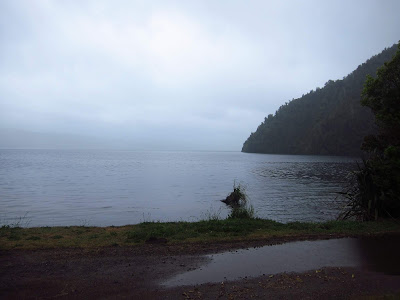Infidelity Causes Suicide
On Lake Rotoiti “The Leaping Place of Tikawe” gets its name from an incident when a Maori woman leapt to her death after being jilted by her husband.
In days long past Tikawe, a high-born woman, lived at Te Taiki pa on a high cliff-top beside Lake Rotoiti with her husband whom she loved dearly.
Historian James Cowan relates that one day Tikawe’s husband went away to the east, while she anxiously awaited his return. But as weeks turned into months she grew more worried every day, becoming increasingly emaciated and listless.
One day a visitor from Heretaunga (Napier) arrived at Te Taiki with the news that Tikawe's husband had fallen in love with a woman there and had settled down with her.
There was much concern on the marae at the way Tikawe had been deserted, with some wanting to raise a war party to punish the adulterer at once. Tikawe did not join the people but remained in her whare that night, distraught and weeping constantly.
Early next morning Tikawe appeared in front of the carved meeting house dressed in her finest garments including a treasured feathered cloak, woven by her own hands. Around her neck hung a precious family greenstone heirloom of exceptional quality, her hair was carefully prepared and adorned with a huia feather. From her ears hung large gleaming-white pointed teeth of a mako shark.
The people scurried from their sleeping places and gathered around Tikawe
as she sang the lament she had composed for her lost husband - a waiata aroha.
Upon completion of her waiata, Tikawe walked to the edge of the high cliffs bordering the pa, looked back once to her people, then plunged over the precipice - to be dashed to a horrible death on the rocks below.
Cowan says: “ever since that time those cliffs have been known as Te Rerenga-a-Tikawe [The Leaping Place of Tikawe]. ln the old days, people paddling their canoes past the place where she leapt would stop for a moment and leave a small branch of kawakawa as an offering to her memory.”
 |
| Lake Rotoiti near The Leaping Place of Tikawe |
In days long past Tikawe, a high-born woman, lived at Te Taiki pa on a high cliff-top beside Lake Rotoiti with her husband whom she loved dearly.
Historian James Cowan relates that one day Tikawe’s husband went away to the east, while she anxiously awaited his return. But as weeks turned into months she grew more worried every day, becoming increasingly emaciated and listless.
One day a visitor from Heretaunga (Napier) arrived at Te Taiki with the news that Tikawe's husband had fallen in love with a woman there and had settled down with her.
There was much concern on the marae at the way Tikawe had been deserted, with some wanting to raise a war party to punish the adulterer at once. Tikawe did not join the people but remained in her whare that night, distraught and weeping constantly.
Early next morning Tikawe appeared in front of the carved meeting house dressed in her finest garments including a treasured feathered cloak, woven by her own hands. Around her neck hung a precious family greenstone heirloom of exceptional quality, her hair was carefully prepared and adorned with a huia feather. From her ears hung large gleaming-white pointed teeth of a mako shark.
The people scurried from their sleeping places and gathered around Tikawe
as she sang the lament she had composed for her lost husband - a waiata aroha.
Upon completion of her waiata, Tikawe walked to the edge of the high cliffs bordering the pa, looked back once to her people, then plunged over the precipice - to be dashed to a horrible death on the rocks below.
Cowan says: “ever since that time those cliffs have been known as Te Rerenga-a-Tikawe [The Leaping Place of Tikawe]. ln the old days, people paddling their canoes past the place where she leapt would stop for a moment and leave a small branch of kawakawa as an offering to her memory.”
Tikawe’s waiata aroha:
"No tidings came of thee
No sign from the winds of heaven,
And long I waited, asking
"Where is my loved One?
When will he return?"
And then O faithless one!
T'was Tera brought the evil news,
Those evil words that travelled slow.
In distant lands thou dwellest,
Where the salt-sea spray flies,
By far Whanganui-a-Rotu.
In Aitu'shome.
And here I go to death,
Grief tears my wounded heart
That jewel once to thee so dear.
In my hair the huia's plume,
Around me these soft flaxen cloaks.
Fair is the land I look upon,
Beautiful the calm face of Rotoiti,
The bright waters of Koko-Hangarua Spread out before me.
But now I gaze my last!
No more shall man approach me;
No more my body's charms entice;
Desolate am I as the forests of Taheke!
Bitterness is in my soul. Ah me."
No sign from the winds of heaven,
And long I waited, asking
"Where is my loved One?
When will he return?"
And then O faithless one!
T'was Tera brought the evil news,
Those evil words that travelled slow.
In distant lands thou dwellest,
Where the salt-sea spray flies,
By far Whanganui-a-Rotu.
In Aitu'shome.
And here I go to death,
Grief tears my wounded heart
That jewel once to thee so dear.
In my hair the huia's plume,
Around me these soft flaxen cloaks.
Fair is the land I look upon,
Beautiful the calm face of Rotoiti,
The bright waters of Koko-Hangarua Spread out before me.
But now I gaze my last!
No more shall man approach me;
No more my body's charms entice;
Desolate am I as the forests of Taheke!
Bitterness is in my soul. Ah me."
 |
| Motutawa Peninsular - site of Te Taki Pa |




Comments
Post a Comment